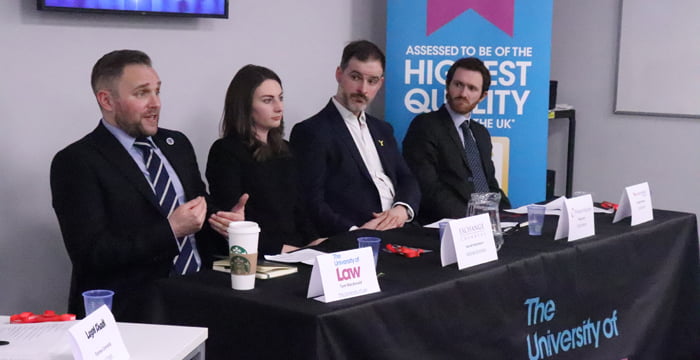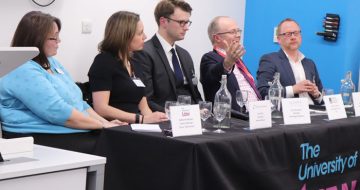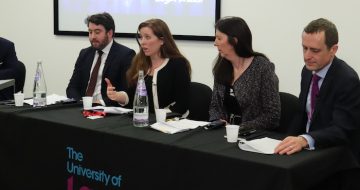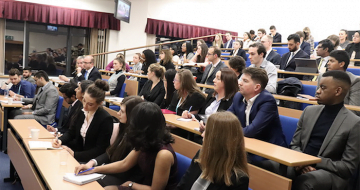Legal Cheek Live recently headed up north for the fourth Secrets to Success event at The University of Law

Here is a rundown of the key themes discussed by the panel of leading lawyers at the event: Pinsent Masons partner Philip Scott, Irwin Mitchell associate Stephen Murphy, Exchange Chambers pupil barrister Harriet Hartshorn and Tom Macdonald, dean of The University of Law in Leeds.
Cyber security
“This is a hot topic right now for large commercial law firms — it’s constantly being stressed to us internally,” says Murphy, an associate in Irwin Mitchell’s commercial dispute resolution team. Pinsent Masons corporate partner Scott echoes this view: “They send an email every so often around our firm to try and catch people out. It comes from a slightly dubious email address and requests we click on a suspicious link. The percentage of clicks is then sent round the office — thankfully that number is going down!”
Following a recent high profile case involving a global law firm whose IT system was compromised, it’s no wonder, says Scott, that law firms are taking extra precautionary measures and encouraging staff to undergo training and remain vigilant.
Hartshorn, a civil and commercial pupil barrister at Exchange Chambers, shares her perspective: “As a barrister, the buck stops with you and you’re individually responsible for your client’s data.” She spends her time travelling between courts, and stresses the importance of making sure that no one on the train can see the document you’re working on.
Will robots take over?
The panel are all in agreement that advances in legal technology could only improve the work they do and will not necessarily impact the numbers coming into law at the junior end. “The predicted demise of lawyers — that we’ll all soon be replaced by robots — hasn’t happened quite yet,” jokes Murphy.
The aim of artificial intelligence (AI), according to Scott, is to take the mundane tasks away from juniors, such as paginating trial bundles (he knew one trainee who had to do this for hours on end) and free them up to undertake more challenging work. He recently advised on a series of ring-fencing projects and used AI to perform bulk analysis of thousands of loan documents to check their transferability provisions. “That would’ve been done by someone sat in a room for 12 hours mind-numbingly checking each clause — it doesn’t have to be that way,” he says. ULaw’s Macdonald agrees and stresses that law firms’ only focus is to get their trainees out there as profitable assets and billing as soon as possible.
Innovation at the bar
The bar is in a period of transition; it’s currently trying to shake off the perception that it’s old-fashioned and afraid to modernise, Hartshorn tells students. “Technology is being given a huge push in chambers. Working on a paperless basis and not having to lug around huge folders to court is quickly becoming my reality”, shares Hartshorn, who is able to condense a large bundle on to her iPad.
Former criminal barrister Macdonald explains that the criminal bar is leading the technological revolution. The introduction of the Digital Case System means there’s now no need to take any paper to the Crown Court and video link is quickly becoming the preferred option for most court hearings.
Technology hasn’t just infiltrated the courtroom experience; the work is also changing and criminals are at the vanguard of this. Macdonald advises that students be aware of new online or digital offences. He says:
“The old idea of barristers sitting in a dusty environment unrolling their parchment could not be further from the truth. Paper is going the way of the dinosaur, and we’re launching modules aimed at helping students understand this direction of travel.”
The changing nature of legal skills
A key skill Scott is looking for in trainees is adaptability and the willingness to embrace change. Though this doesn’t mean training contract hunters should learn how to code — his firm have a team of trained programmers that work alongside lawyers to come up with automated precedents or AI vehicles. Hartshorn thinks it’s imperative students demonstrate these skills in a way that shows they can add value to a firm or chambers. “I’ve reviewed several CVs where students are still putting ‘fully literate in Microsoft Office’ as a bullet point under their skills section. Well, of course! There’s an assumption that your generation is tech-literate,” she says. Her advice is to look further afield — at legal research tools such as Westlaw and LexisNexis that offer specialist training, since these accurately reflect the research undertaken in practice.
Macdonald interacts with aspiring lawyers on the regular, and says: “In the era of Snapchat, Instagram and WhatsApp’ing — students have to learn to cope with email, address people professionally and keep on top of correspondence. You also need to know how to write a letter because this still does happen!” And in what he describes as “the culture of unfettered sharing”, aspiring lawyers should think very carefully about their privacy settings and what they share online.
“In the era of Snapchat, Instagram and WhatsApp’ing, students have to learn how to cope with email and students HATE email,” says ULaw Leeds dean Tom Macdonald, speaking at our latest #LegalCheekLive Secrets to Success event in the city
Posted by Legal Cheek on Monday, 9 April 2018
Leeds over London?
The panel, who all work in Leeds, were quick to promote the Northern Powerhouse. Macdonald, who has had the benefit of working in both Leeds and London says: “We call it the ‘graduate neck-flick’ here at ULaw. When students graduate, it’s common for them to think that London is the only place to be — don’t fall into that trap.” Hartshorn agrees: “It’s not a case that ‘all the real barristers reside in London’. I’ve been handling my own caseload from day one of my second-six and have completed fast-track trials within a month of being on my feet. This is unrivalled elsewhere.”
With over 18 years in practice, and a good portion of that spent in Leeds, Scott says that the quality of work in the regions is definitely on par with London. You also get the added benefit, he jokes, of living in Yorkshire. He continues: “It may have been the case ten years ago that you had to go to London to do the top draw work and be among the top level of lawyers because when I started here we were only doing £1-2 million lends. Now? A £400 million lend working with several jurisdictions is the norm.”
About Legal Cheek Careers posts.


